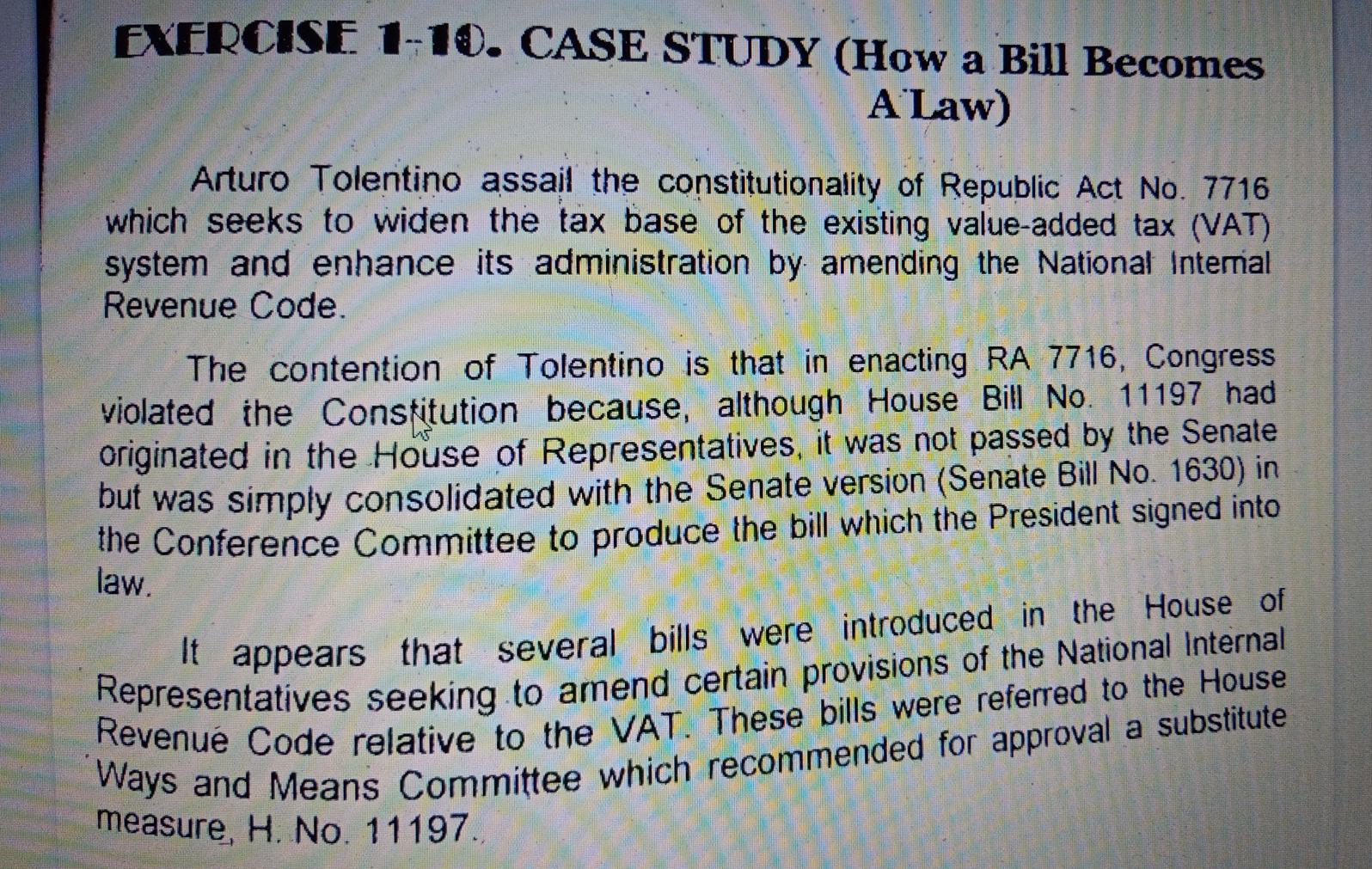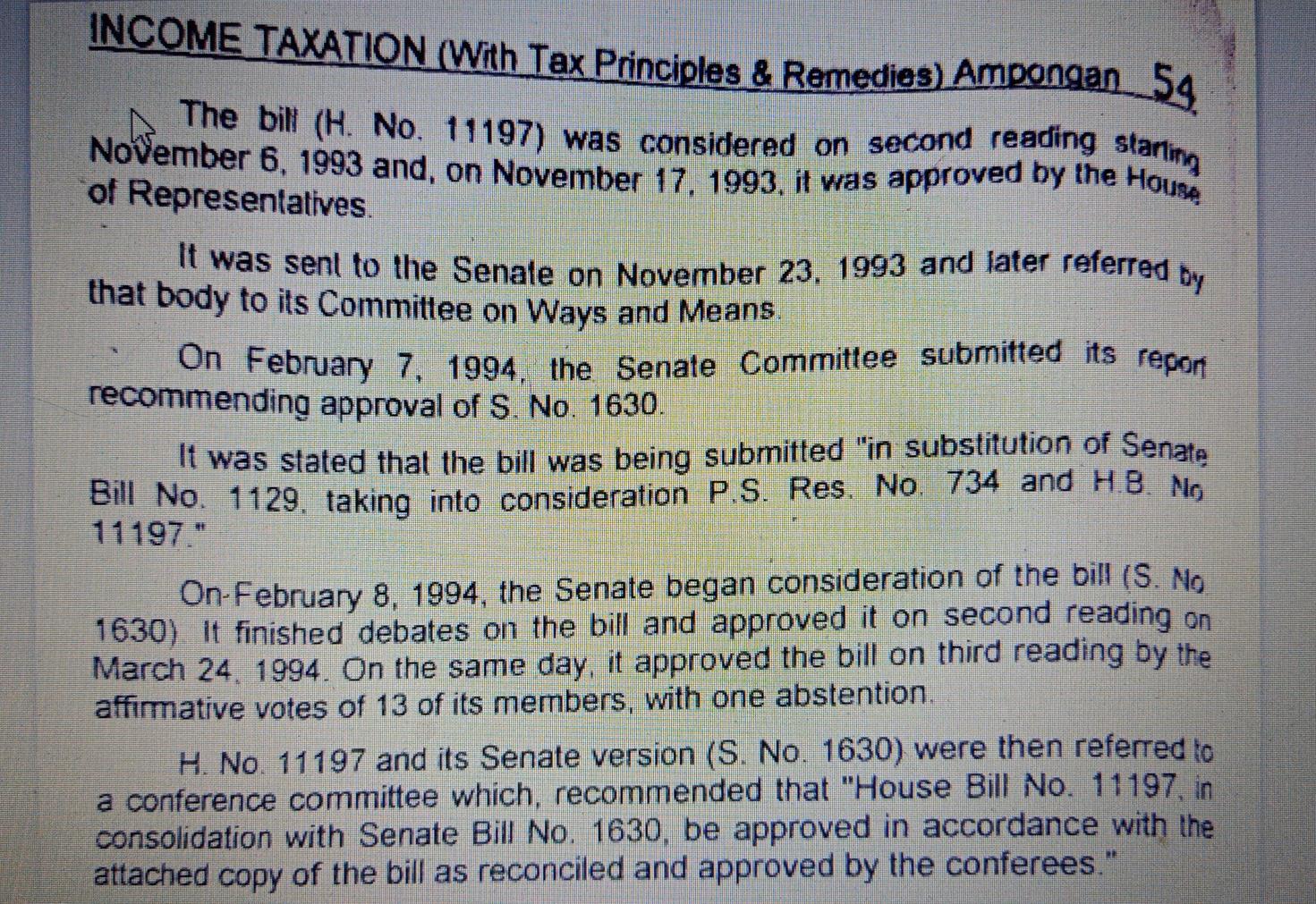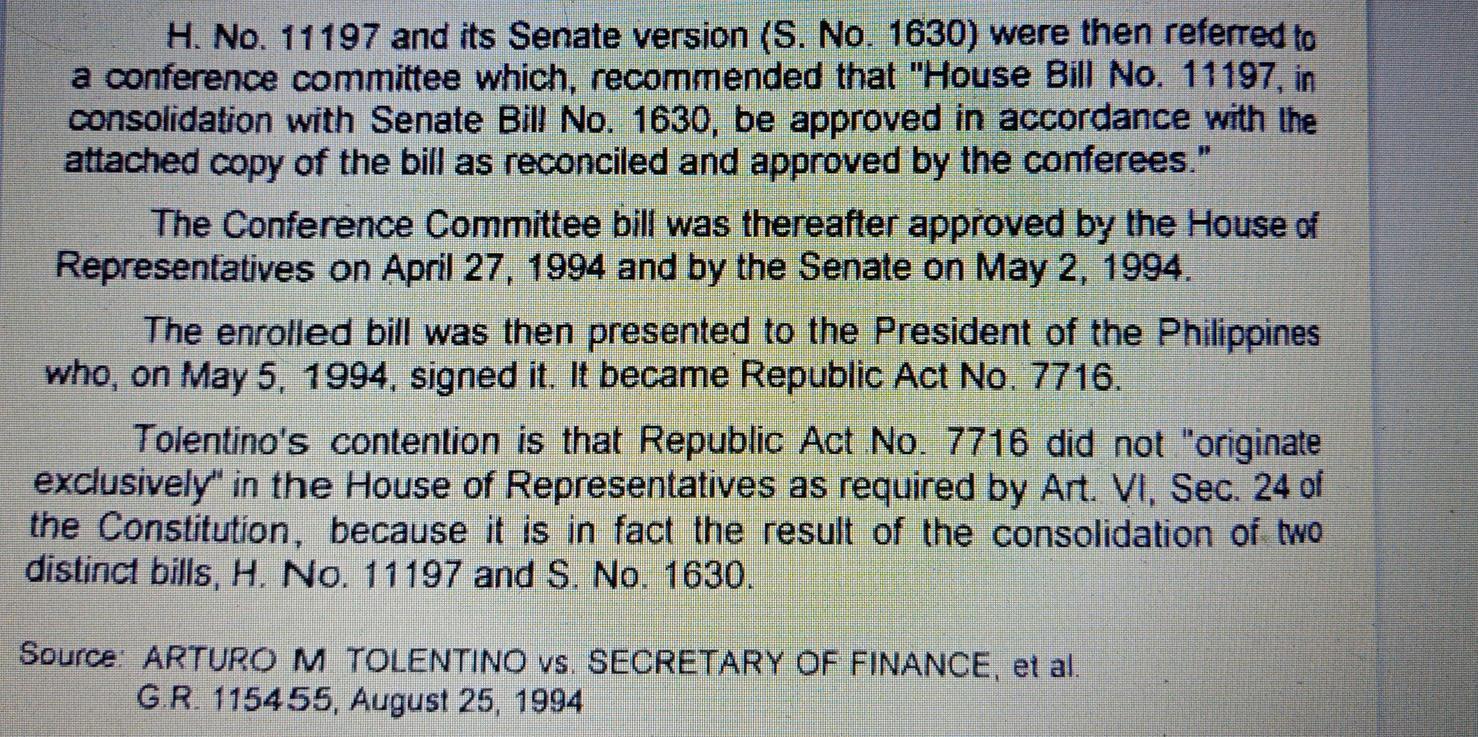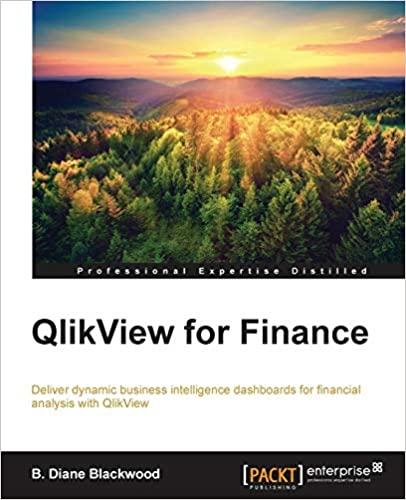Answered step by step
Verified Expert Solution
Question
1 Approved Answer
Revenue Code relative to the VAT. These bills were referred to the House Ways and Means Committee which recommended for approval a substitute EXERCISE 1-10.



Revenue Code relative to the VAT. These bills were referred to the House Ways and Means Committee which recommended for approval a substitute EXERCISE 1-10. CASE STUDY (How a Bill Becomes A'Law) Arturo Tolentino assail the constitutionality of Republic Act No. 7716 which seeks to widen the tax base of the existing value-added tax (VAT) system and enhance its administration by amending the National Intemal Revenue Code. The contention of Tolentino is that in enacting RA 7716, Congress violated the Constitution because, although House Bill No. 11197 had originated in the House of Representatives, it was not passed by the Senate but was simply consolidated with the Senate version (Senate Bill No. 1630) in the Conference Committee to produce the bill which the President signed into law. It appears that several bills were introduced in the House of Representatives seeking to amend certain provisions of the National Internal measure, H. No. 11197., INCOME TAXATION (With Tax Principles & Remedies) Ampongan 59 The bih (H. No. 11197) was considered on second reading starling November 6, 1993 and, on November 17. 1993, it was approved by the House It was sent to the Senate on November 23, 1993 and later referred by On February 7, 1994, the Senate Committee submitted its repor that body to its Committee on Ways and Means. of Representatives recommending approval of S. No. 1630 It was stated that the bill was being submitted "in substitution of Senate Bill No. 1129. taking into consideration P.S. Res. No 734 and H.B. No 11197." On-February 8, 1994, the Senate began consideration of the bill (S. No 1630) it finished debates on the bill and approved it on second reading on March 24. 1994. On the same day, it approved the bill on third reading by the affirmative votes of 13 of its members, with one abstention. H. No. 11197 and its Senate version (S. No. 1630) were then referred to a conference committee which, recommended that "House Bill No. 11197, in consolidation with Senate Bill No. 1630, be approved in accordance with the attached copy of the bill as reconciled and approved by the conferees." 10.919901 H. No. 11197 and its Senate version (S. No. 1630) were then referred to a conference committee which, recommended that "House Bill No. 11197, in consolidation with Senate Bill No. 1630, be approved in accordance with the attached copy of the bill as reconciled and approved by the conferees." The Conference Committee bill was thereafter approved by the House of Representatives on April 27, 1994 and by the Senate on May 2, 1994. The enrolled bill was then presented to the President of the Philippines who, on May 5, 1994, signed it. It became Republic Act No. 7716. Tolentino's contention is that Republic Act No. 7716 did not "originate exclusively" in the House of Representatives as required by Art VI. Sec. 24 of the Constitution, because it is in fact the result of the consolidation of two distinct bills, H. No. 11197 and S. No. 1630. Source: ARTURO M TOLENTINO vs. SECRETARY OF FINANCE, et al. GR. 115455, August 25, 1994 Revenue Code relative to the VAT. These bills were referred to the House Ways and Means Committee which recommended for approval a substitute EXERCISE 1-10. CASE STUDY (How a Bill Becomes A'Law) Arturo Tolentino assail the constitutionality of Republic Act No. 7716 which seeks to widen the tax base of the existing value-added tax (VAT) system and enhance its administration by amending the National Intemal Revenue Code. The contention of Tolentino is that in enacting RA 7716, Congress violated the Constitution because, although House Bill No. 11197 had originated in the House of Representatives, it was not passed by the Senate but was simply consolidated with the Senate version (Senate Bill No. 1630) in the Conference Committee to produce the bill which the President signed into law. It appears that several bills were introduced in the House of Representatives seeking to amend certain provisions of the National Internal measure, H. No. 11197., INCOME TAXATION (With Tax Principles & Remedies) Ampongan 59 The bih (H. No. 11197) was considered on second reading starling November 6, 1993 and, on November 17. 1993, it was approved by the House It was sent to the Senate on November 23, 1993 and later referred by On February 7, 1994, the Senate Committee submitted its repor that body to its Committee on Ways and Means. of Representatives recommending approval of S. No. 1630 It was stated that the bill was being submitted "in substitution of Senate Bill No. 1129. taking into consideration P.S. Res. No 734 and H.B. No 11197." On-February 8, 1994, the Senate began consideration of the bill (S. No 1630) it finished debates on the bill and approved it on second reading on March 24. 1994. On the same day, it approved the bill on third reading by the affirmative votes of 13 of its members, with one abstention. H. No. 11197 and its Senate version (S. No. 1630) were then referred to a conference committee which, recommended that "House Bill No. 11197, in consolidation with Senate Bill No. 1630, be approved in accordance with the attached copy of the bill as reconciled and approved by the conferees." 10.919901 H. No. 11197 and its Senate version (S. No. 1630) were then referred to a conference committee which, recommended that "House Bill No. 11197, in consolidation with Senate Bill No. 1630, be approved in accordance with the attached copy of the bill as reconciled and approved by the conferees." The Conference Committee bill was thereafter approved by the House of Representatives on April 27, 1994 and by the Senate on May 2, 1994. The enrolled bill was then presented to the President of the Philippines who, on May 5, 1994, signed it. It became Republic Act No. 7716. Tolentino's contention is that Republic Act No. 7716 did not "originate exclusively" in the House of Representatives as required by Art VI. Sec. 24 of the Constitution, because it is in fact the result of the consolidation of two distinct bills, H. No. 11197 and S. No. 1630. Source: ARTURO M TOLENTINO vs. SECRETARY OF FINANCE, et al. GR. 115455, August 25, 1994
Step by Step Solution
There are 3 Steps involved in it
Step: 1

Get Instant Access to Expert-Tailored Solutions
See step-by-step solutions with expert insights and AI powered tools for academic success
Step: 2

Step: 3

Ace Your Homework with AI
Get the answers you need in no time with our AI-driven, step-by-step assistance
Get Started


